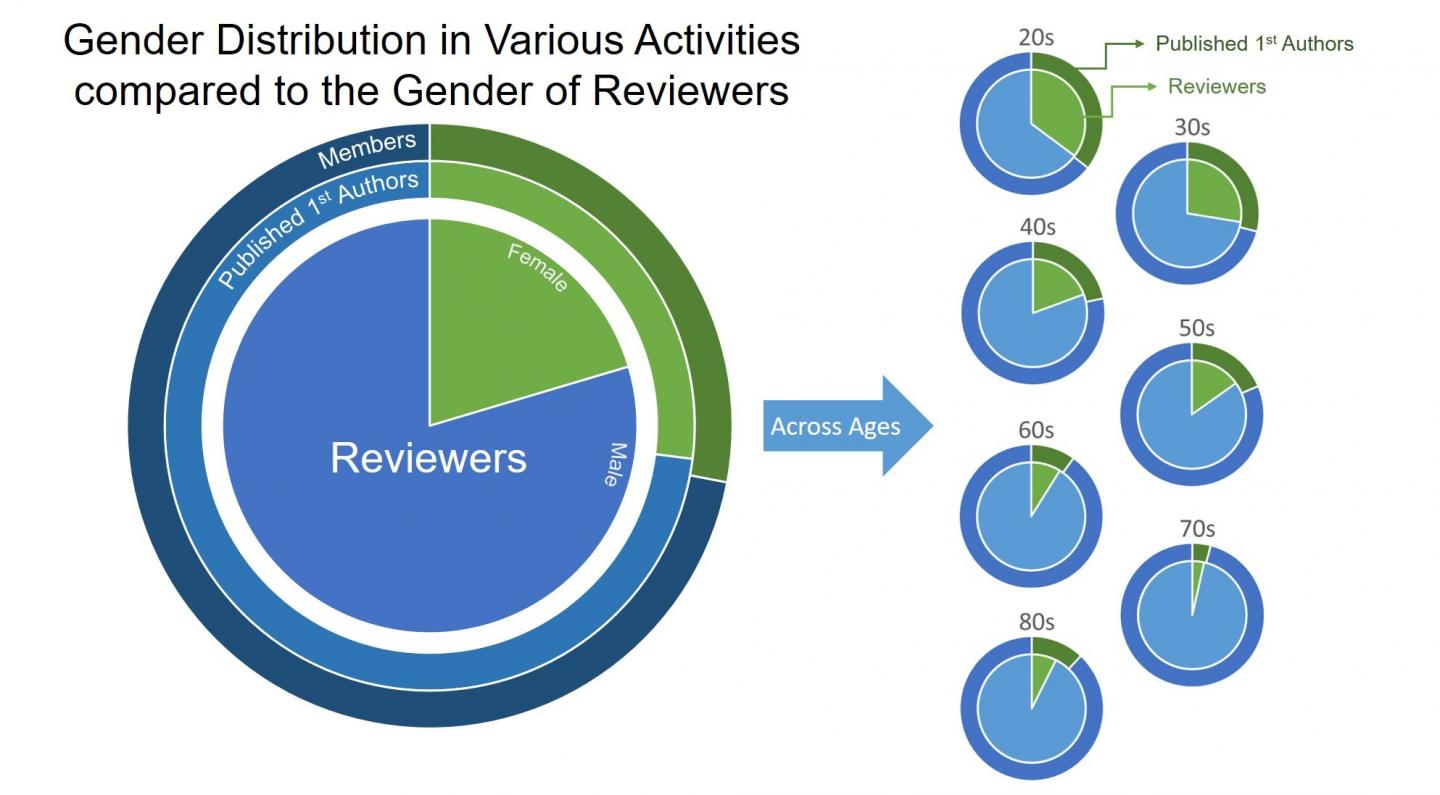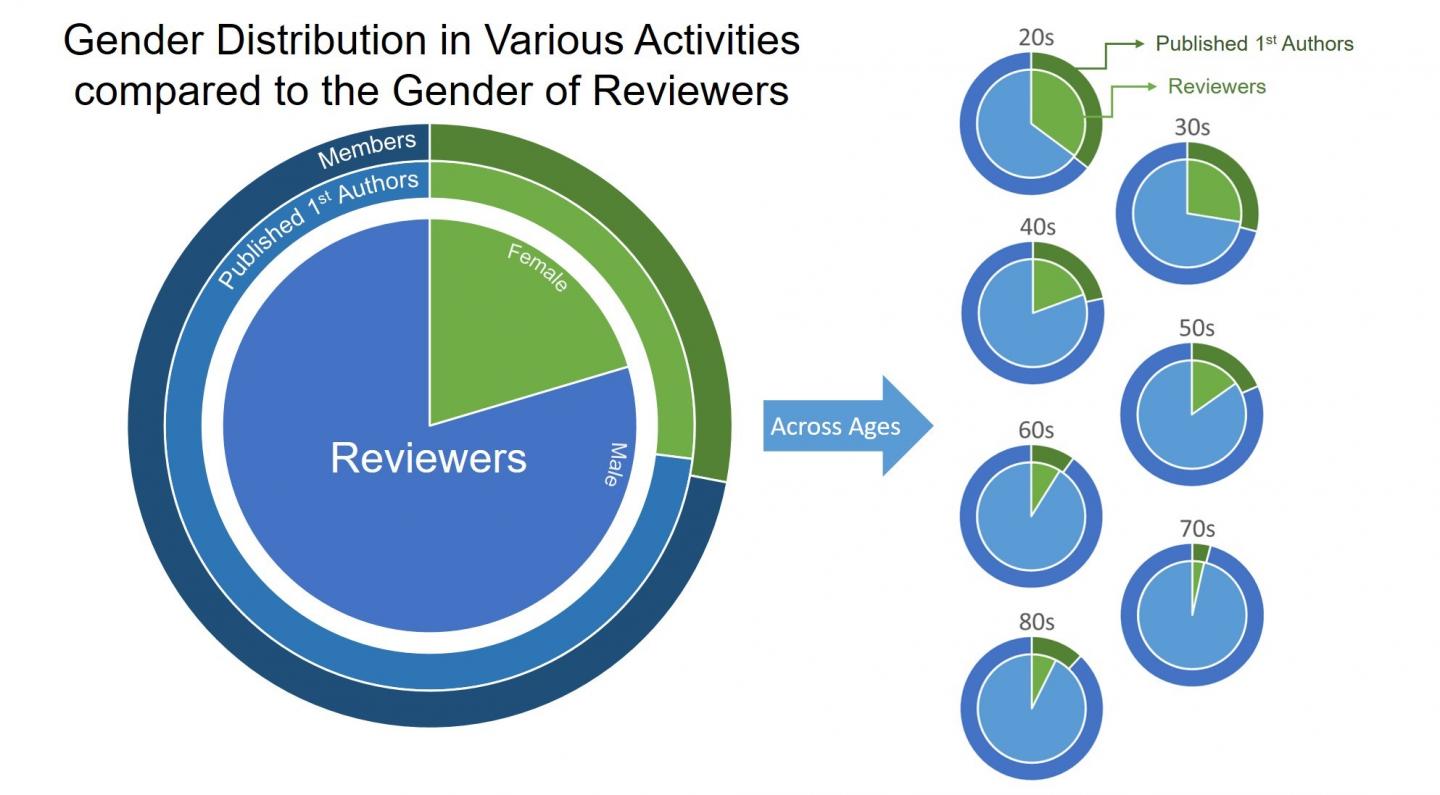
Credit: Credit: Jory Lerback
WASHINGTON, DC — Publishers of scholarly journals should take additional steps to get more women to serve as peer reviewers of manuscripts, according to a new analysis by the American Geophysical Union showing women across all age groups have fewer opportunities than men to participate in this career-building activity.
Peer review is an essential part of scholarly publishing and building a scientific career. Scientific journals rely on reviews of manuscripts by experts to ensure the standards, quality and significance of the papers published in their journals. Reviewing manuscripts helps scientists develop their own writing and expertise and foster relationships with others in the field.
Now, a new comment piece by AGU authors published in the journal Nature finds women are less likely to contribute to this important activity than their male counterparts across all age groups.
The new research finds that from 2012 to 2015 there were fewer female reviewers for papers published in AGU journals than expected for most age groups. Overall, women accounted for 20 percent of all peer reviewers. This was significantly lower than the percentage of women who were accepted first authors on journal papers – 27 percent – and lower than the percentage of AGU members who are women – 28 percent. These differences extended across most age groups. In contrast, papers with women first authors were accepted at a higher rate than papers with male first authors across all age groups.
The lower number of female peer reviewers is a result of fewer women being suggested or asked to review journal articles by authors and editors, especially men. Slightly more women across all age groups also declined to be a peer reviewer when asked, according to the new research.
The new analysis considered both age and gender of authors and reviewers. Accounting for age is necessary to explore bias because the proportion of women geoscientists decreases greatly with age.
"With this study, we are really trying to show the data and let people start having a conversation that something as little as requesting reviewers can add up to a large impact on people's careers," said Jory Lerback, a former data analyst at AGU and lead author of the comment piece. "Previously, we never even knew this was a problem. Some people may have suspected it and asked about it, but to be able to show this is a real problem is a big moment."
The new analysis highlights the problem of gender bias in science, which has been identified as an important cause of the underrepresentation of women in science, technology, engineering and mathematics. Previous studies have found women and minorities are disadvantaged in hiring or promotion decisions, awarding of grants, invitations to conferences, nominations for awards and forming professional collaborations.
Getting more women involved in peer reviewing journal articles could help in advancing and retaining women in science. It also could lead to the inclusion of more diverse viewpoints in scientific studies, said Lerback, who is now a graduate student at the University of Utah in Salt Lake City.
The results of the new study are likely representative of a trend occurring across scholarly publishing, and highlight the need for journal publishers to make additional efforts to train and educate their staff in combating gender bias in peer review, according to Lerback and co-author Brooks Hanson, AGU's director of publications. For example, publishers should encourage authors and editors to invite more women to review manuscripts, especially younger women.
"A better understanding and awareness of the issue of implicit bias across career-building activities will lead to better advancement and retention of women in the sciences," said AGU President Eric Davidson. "As the world's largest society for Earth and space scientists, AGU is committed to fostering inclusivity and greater diversity in the talent pool, and this study is one of several inclusivity efforts that we are leading. We encourage other organizations and institutions to analyze their own data for biases so that we can better address the issue as a community."
The new study used information from AGU's 20 scientific journals and its member database to look at the gender and age of authors and peer reviewers of papers submitted to the society's journals. AGU published more than 6,000 papers in 2016 and has 60,000 members worldwide.
The authors encourage other scientific societies, funding agencies and publishers to consider similar audits, and consider how other underrepresented groups might be affected in similar ways to women.
"It is relatively easy for us to gather this binary gender data, but other underrepresented groups are not so easily measurable," Lerback said. "As part of the conversation, I hope people will think about these mechanisms affecting women that may affect other underrepresented groups."
###
The American Geophysical Union is dedicated to advancing the Earth and space sciences for the benefit of humanity through its scholarly publications, conferences, and outreach programs. AGU is a not-for-profit, professional, scientific organization representing 60,000 members in 137 countries. Join the conversation on Facebook, Twitter, YouTube, and our other social media channels.
AGU Press Contacts:
Caitlyn Camacho
+1 (202) 777-7423
[email protected]
Nanci Bompey
+1 (202) 777-7524
[email protected]
University of Utah Press Contact:
Lisa Potter
+1 (801) 585-3093
[email protected]
Media Contact
Nanci Bompey
[email protected]
202-777-7524
@theagu
http://www.agu.org
############
Story Source: Materials provided by Scienmag





